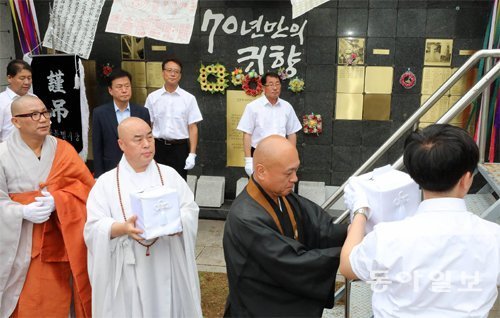Remains of 33 Korean forced laborers return home from Japan
Remains of 33 Korean forced laborers return home from Japan
Posted August. 17, 2017 07:36,
Updated August. 17, 2017 08:03

The Seoul metropolitan government held a ceremony Wednesday to bury the remains of 33 Korean forced laborers during the Japanese colonial rule at Seoul City Yongmi-ri Second Cemetery Park located in Paju, Gyeonggi Province.
The remains of the 33 victims who were forced to slave labor by the Japanese imperialists, have been buried at the Memorial Hall at Second Cemetery Park, after completing a restoration ceremony at Gukpyeong-sa, a Buddhist temple for ethnic Koreans in Tokyo, Japan on August 6. They are the remains of 33 people who have returned to Korea before others among the remains of 101 bodies who were identified through collaboration by Gukpyeong-sa and the Korean civic group to restore the remains of Korean forced laborers during the Japanese imperial rule. The remains of the 68 others will also return to Korea in phases.
The committee requested the Seoul metropolitan government to bury the remains in line with the will of many forced laborers who had wished to be buried in their motherland after death. The city government has decided to bury the remains temporarily at the Memorial Hall until a new cemetery for overseas Koreans at Peace Park in the demilitarized zone is completed. The city government plans to bury the remains of additional 33 bodies next year and those of 35 others in 2019. In 2015 when Korea marked the 70th anniversary of national liberation, the remains of 115 forced laborers in Hokkaido were buried there.
“We hope this effort will provide an opportunity for citizens to remember and commemorate Korean forced laborers during the Japanese imperial rule and properly recognize and understand history,” said Kim Bok-jae, head of the senior citizens welfare division at the Seoul city government.
Tae-Ho Hwang taeho@donga.com







